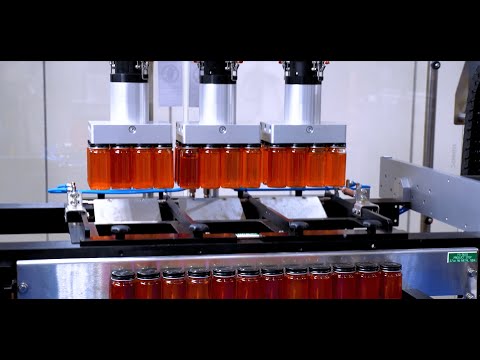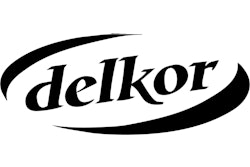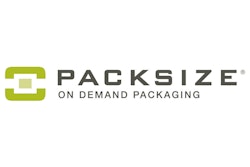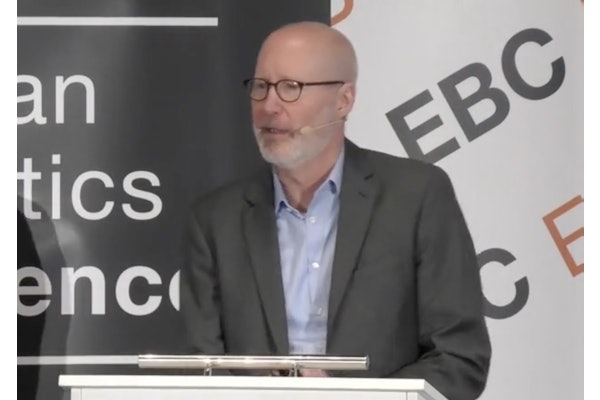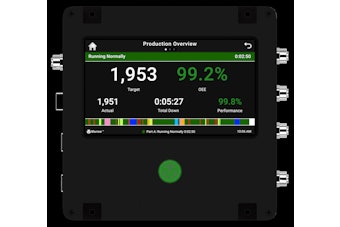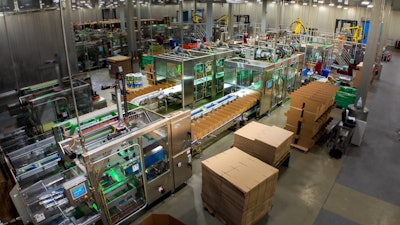
Soules Foods is a brand built on consistency and innovation, known across the U.S. for its high-quality, ready-to-cook and fully cooked meat and poultry products, many under its own consumer brand Soules Kitchen. The company’s products can be found from retail shelves to foodservice locations, and demand keeps pushing the company to grow. Its newest facility in Valley, Ala.—one of the most advanced poultry plants in North America—is a case in point. Beyond adding production capacity, the new site represents a shift toward high-efficiency automation, enabling the company to tackle rising demand, persistent labor challenges, and increasingly diverse product lines.
In 2024, the Valley team turned to Delkor Systems to solve a suite of pressing needs for operations that involved packing bags of proteins, chicken nuggets for instance, into corrugated cases. Requirements included boosting packaging speeds, reducing floor space, and simplifying changeovers across a broad mix of SKUs. The answer came in the form of EVO, a patented, vision-guided, six-axis cartesian robotic case packer that the company says is 33% smaller and as much as 50% faster than current technology.
“EVO has been a perfect match for us with increased productivity, labor reduction, and improved ergonomics,” says John Cardin, operations manager at Soules Foods. “We were able to increase productivity with it pretty much instantaneously.”
Why change?
Before EVO, Soules Foods had already invested in robotic automation. But like many processors, the company found limitations. Speed ceilings, long changeovers, and large machine footprints left little room for growth. As product diversity expanded from 1-lb retail bags to 5-lb foodservice SKUs, the gaps in flexibility became more apparent.
Today, Soules Foods relies on the EVO system to handle a wide range of bagged product formats destined for major retail outlets, including Walmart, grocery chains, and club stores. The line accommodates everything from smaller retail packs—such as 16- and 28-oz bags in 10- and 12-count case configurations—to heavier foodservice-style SKUs like 5-lb bags in 2-, 4-, and 6-count cases. Whether packed in standard or specialty cases like Delkor’s Cabrio Case, the EVO platform delivers the flexibility and performance needed to manage this SKU diversity efficiently, Cardin’s team says.
Traditional delta or articulated robotic arm systems often required complicated upstream conveyance to singulate products, resulting in more cost, more space, and more integration headaches.
“When we saw the [EVO] machine for the first time, we noticed the footprint was quite small. I was extremely surprised to see its increased productivity, running 40% faster,” Cardin says.
Evolution of a machine system
Four years ago, a team of Delkor engineers came to Dale Andersen, Delkor’s CEO and owner, with a proposal. They believed they had a design concept for a new generation of vision-based robotic case packers that would break through two technical barriers that exist globally.
“If our engineers were correct, their concept would redefine what is possible with vision-based robotic case packing,” Andersen says. “In the end, I approved a multi-year R&D effort we named Project EVO. In 2024 Delkor completed two EVO case packing lines, one monoblock line for demonstration at PACK EXPO Chicago, and a second line for installation at one of our customers’ plants, to prove out this new technology in production. And since January 2025 EVO has been performing in two-shifts per week at Soules Foods. Our engineers have been able to validate every metric we had hoped to achieve.”
According to Andersen, Delkor’s EVO rethinks what robotic case packing should look like. He says that it’s not just a faster robot; it’s a different architecture altogether—built from the ground up to solve for the pain points faced by operations like Soules Foods. Soules Foods’ compact two-cell EVO system—each five-ft cell is capable of 70 picks/min.Delkor/Soules Foods
Soules Foods’ compact two-cell EVO system—each five-ft cell is capable of 70 picks/min.Delkor/Soules Foods
Speed with simplicity
At the Alabama facility, each EVO cell picks two products concurrently while using advanced vision to track product position and orientation in real-time. That means case packing as fast as 70 products/min, per 5-ft cell—all without the jerky, forced motion common to high-speed systems. In fact, according to the company, EVO’s vision infeed runs up to 200 ft/min, nearly double what legacy technology allows.
“That eliminates the need for complex upstream lane dividers and separating conveyors,” says Tanner Tomblin, maintenance technician at Soules Foods. “When product comes in and it’s turned sideways, or the orientation’s wrong, or the spacing’s off, it can overcome that. I think that’ll improve not just what we can do, but the kind of products that we can run.”
Soules Foods engineers had the future in mind when specifying the EVO machine installation. The modular EVO architecture supports configurations from one to four robotic cells, capable of packing up to 280 products/min, with products being bags or pouches ranging from as small 2 oz, all the way up to 30 lb. Soules began with a two-cell system running 140 bags/min, with the option to scale up as demand grows.
The EVO’s end-of-arm tooling in this application has 3 in. of compliance, allowing it to easily pick up irregularly shaped bags and pouches, making it ideal for Soules Foods’ production of large bags of patties, nuggets, and diced products, the companies say.
EVO’s high speed and compact footprint don’t compromise run time, the brand owner says. An integrated case former includes an internal magazine that holds up to 500 B-flute corrugated blanks—approximately three times the runtime of a traditional case erector.
Eye for the future and scaling
Soules Foods engineers began the EVO machine trials viewing flexibility for future growth as a critical, make-or-break feature. After all, other EVO installations might be in the cards for this or other facilities in coming years—but each installation might have different specific application requirements. Since it’s available as a monoblock or modular system, and in inline or counterflow formats, EVO can be reconfigured to fit nearly any layout that Soules might need, in any facility: tight, curved, or split across levels. EVO adapts without sacrificing speed or accuracy, the protein producer observes.
For now, the new facility affords Soules Foods some breathing room, but demand has the company growing. If it were to need the tech, a 1-cell monoblock EVO case packer easily fits into its existing floor plans, replacing longer, less efficient layouts. In fact, the full case packing solution—including forming, loading, and sealing—can be accomplished in as little as 25 ft of line length and 6 ft in width.
Vertical startups, warped board correction
The team at Soules Foods also says it appreciates the equipment’s simple changeovers and vertical startups, eliminating the long, unproductive ramp up period that many systems require to get to running speed. That simple changeover and vertical startup comes from Delkor’s patent-pending SmartLock technology, which the company says “simplifies changeovers visually.” Soules’ operators move each change point until a green light confirms it’s locked on target. It’s simple and error proof. The HMI tracks progress and automatically locks once setup is complete—an EVO case packing line can change over in less than 10 minutes. At Soules Foods’ Valley facility, most changeovers on the EVO take less than four minutes.
Another optional module that Soules Foods is considering is EVO’s integrated case forming system that employs a patented, laser-guided technique to eliminate warp in corrugated—forming perfectly square cases even from lower-grade corrugated materials in humid and dry environments.
“Warped corrugated is the number one issue in a lot of plants, and Soules Foods has trouble with it, too,” says Kevin Weiss, VP of operations at Delkor Systems. “Inconsistent material can shut down even the most efficient lines. Delkor’s new corrugated warp correction technology solves the issue, allowing for three times the PMMI standard.”
Ultimately, in an era of SKU proliferation and an always-widening range of products and pack formats, Soules Foods has to be ready for what’s next. That’s why the company noticed that Delkor’s case formers have been awarded four patents for tackling the issue and can make small, 4-in shelf ready displays all the way up to quarter pallet trays. The EVO’s end-of-arm tooling in this application has 3 in. of compliance, allowing it to easily pick up irregularly shaped bags and pouches, making it ideal for Soules Foods’ production large bags of patties, nuggets, and diced products, the companies say.Delkor/Soules Foods
The EVO’s end-of-arm tooling in this application has 3 in. of compliance, allowing it to easily pick up irregularly shaped bags and pouches, making it ideal for Soules Foods’ production large bags of patties, nuggets, and diced products, the companies say.Delkor/Soules Foods
Fully integrated line
Frozen nuggets exit the spiral freezer and are distributed across five vertical baggers, each paired with combination scales for accurate portioning. From there, filled bags are conveyed via a Delkor-built transport system that directs products to multiple downstream packaging lines. Packaging World inquired about all the equipment on the line, but Soules Foods only disclosed Delkor as a manufacturer.
Each bag passes through an X-ray scanner and checkweigher for quality and weight verification before entering the case packing stage. At this point, the EVO case packer uses its vision-guided cartesian robots to pick and place bags into corrugated cases based on size, orientation, and pack pattern. Once loaded, cases proceed through another checkweigher to confirm overall weight and case count.
Following verification, cases are labeled with labeling equipment that applies required product and shipping information. Palletizing is performed by a Delkor-designed system, and final load containment is handled by a stretch wrapper.
For internal logistics, autonomous mobile robots (AMRs) manage the movement of pallets—delivering empty ones to the line and transporting full, wrapped loads to freezer storage. This setup allows for continuous operation and limits manual material handling on the floor.
Delkor served as the lead integrator for the full secondary packaging line at Soules Foods, overseeing the design, build, and integration of all equipment and conveyance systems. Prior to installation, a complete factory acceptance test (FAT) was conducted at Delkor’s Minneapolis headquarters to ensure system readiness and performance. This soup-to-nuts automation solution allowed Soules Foods to scale up production while maintaining tight control over labor, space utilization, and product quality.
Packaging engineering as a service
As part of the project, Delkor’s in-house Packaging Lab helped Soules Foods redesign its case formats to maximize efficiency. By moving from RSC to flat-blank formats—including Delkor’s patented Cabrio Case and club store trays—Soules Foods cut down on both material use and machine changeover times. Soules Foods says that the use of flat-blank cases (instead of RSCs) saved up to 22% on corrugated materials and significantly improved downstream automation reliability.
Weiss explains, “Being a true automation partner means going beyond machinery—we actively help our customers with case and carton design. That’s why we invested in a full-service Packaging Lab and brought an in-house packaging engineer on board six years ago. We offer this service at no charge, and even the largest CPG companies have found it to be an effective way to validate new packaging concepts. With our collaboration, we’re able to accomplish in a few days what might take months working through traditional corrugated suppliers. It’s been very rewarding to watch our customers save hundreds of thousands of dollars through smarter, more efficient designs.”
Sanitation, service, and support
Given the nature of its products, Soules Foods maintains the highest hygienic standards and requires the utmost in washdown capability in its equipment. That’s why the company was attracted to EVO, which is built completely from stainless steel, including guarding and minimal surfaces for hygienic environments. The design is easy to wash down, yet robust enough for 24/7 industrial use, the brand owner says.
Smart diagnostics, remote support tools, and standard controls (including robot controls) make maintenance straightforward and scalable and for seamless operation and avoid redundant controls systems and teach pendants.
Delkor’s on-site training, remote diagnostics, and modular replacement strategies ensure Soules Foods’ long-term uptime and flexibility to add new SKUs and formats.
What’s Next?
Looking ahead, Soules Foods continues to rely on Delkor for support as it evaluates the next phase of automation at its Valley facility. The two teams have been working together to optimize the current line, with a focus on increasing speeds and demonstrating the full efficiency potential of the EVO system. This effort plays a key role in helping Soules Foods build a case for additional automation investments at the site.
A quote is already in place for a second EVO system—a single-cell unit—which would provide added flexibility and capacity. As demand continues to grow and SKU variety expands, the partnership remains central to planning future upgrades. PW

